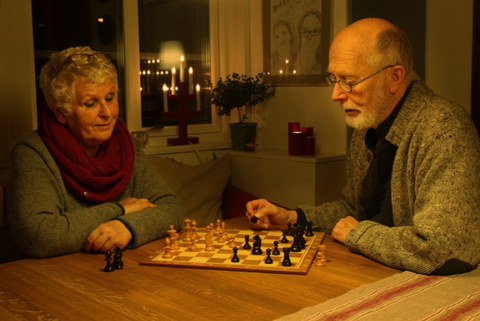Training, Brain Stimulation & Plasticity - TRAINSTIM
Enhancing flexible cognitive control and decision-making in older adults by cognitive training (funded by BMBF)
Theoretical Background
The ability to flexibly adapt behavior and to choose optimally between different choice options, enables older adults to live their life actively and independently. In the course of healthy aging, the neural correlates underlying these abilities undergo apparent declines. Previous research provides evidence for a positive effect of cognitive training and brain stimulation on older adults’ behavioral and brain plasticity.
However, research on the effects of cognitive training on decision-making in older adults is still sparse. Here, we aim to address this issue by investigating the effects of home-based cognitive training to improve decision-making, as well as the brain neural correlates underlying any improvements.
The present project is part of a consortium project TRAINSTIM funded by the Federal Ministry of Education and Research (BMBF). This consortium aims at developing and optimizing combined cognitive training and brain stimulation protocols to enhance older adults’ sensorimotor function, memory, cognitive control and decision-making processes. The present subproject focuses on flexible cognitive control and decision-making processes.
Project Aims
-
To study the effects of 18 days of home-based cognitive training on behavioral and brain plasticity in flexible cognitive control and decision-making processes
- To investigate if the effects of decision-making training are transferable to other cognitive tasks
Principal Investigator and Team
Former Staff
- Dr. Kathleen Yen Li Kang
- Dr. Susanne Passow
- Assistant-Prof. Dr. Ben Eppinger
- M.Sc. Luca Spliethoff
- Dr. Annika Dix (Chair of Engineering Psychology and Applied Cognitive Research)
Collaborators
- Prof. Dr. Agnes Flöel, Universitätsmedizin Greifswald
- Prof. Friedhelm Hummel, École polytechnique fédérale de Lausanne (EPFL) - Genf/Sion
- Prof. Dr. Michael Nitsche, Leibniz Research Centre for Working Environment and Human Factors at TU Dortmund
- Prof. Dr. Michael Falkenstein / Prof. Dr. Jörg Lewald, Leibniz Research Centre for Working Environment and Human Factors at TU Dortmund
Selected Project-relevant Publications
Antonenko, D., Thams, F., Uhrich, J., Dix, A., Thurm, F., Li, S.-C., ... Flöel, A. (2019). Effects of a multi-session cognitive training combined with brain stimulation (TrainStim) on age-associated cognitive decline – study protocol for a randomized controlled Phase IIb (monocenter) trial. Frontiers in Aging Neuroscience, 11, Article 200, 1-12. https://doi.org/10.3389/fnagi.2019.00200
Wittkuhn, L. W., Eppinger, B., Bartsch, L. M., Thurm, F., Kord, F. M., & Li. S.-C. (2018). Repetitive transcranial magnetic stimulation over dorsolateral prefrontal cortex modulates value-based learning during sequential decision-making. NeuroImage, 167, 384-395. https://doi.org/10.1016/j.neuroimage.2017.11.057
Eppinger, B., Heekeren, H. R. & Li, S.-C. (2015). Aging-related prefrontal impairments implicate deficient prediction of future reward in older adults. Neurobiology of Aging, 36(8), 2380–2390. https://doi.org/10.1016/j.neurobiolaging.2015.04.010
Passow, S., Westerhausen, R., Hugdahl, K., Wartenburger, I., Heekeren, H. R., Lindenberger, U., & Li, S.-C. (2014). Electrophysiological correlates of adult age differences in attentional control of auditory processing. Cerebral Cortex, 24, 249-260. https://doi.org/10.1093/cercor/bhs306
Neuronal Basis of Active Aging
Funding Number: 01GQ1424D



